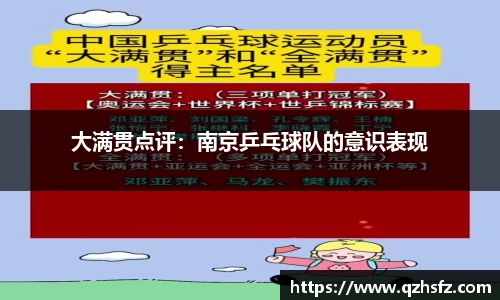意识表现的整体评析
在刚刚结束的大满贯赛事中,南京乒乓球队以其卓越的表现引起了广泛关注。球队不仅在技术上展现出色,更在比赛意识和团队配合方面表现得尤为突出。本文将从四个方面详细分析南京乒乓球队的意识表现,包括战术灵活性、心理素质、团队协作及应对压力能力。这些因素共同构成了球队在赛事中的成功,也为未来的发展奠定了坚实基础。
首先,南京队员们展示了高度的战术灵活性,他们能够根据对手的不同情况及时调整策略。其次,球员们的心理素质相当过硬,在关键时刻能够保持冷静,并做出正确决策。此外,球队内部良好的团队协作使得每一位球员都能充分发挥自己的优势。最后,面对强大的压力时,南京队员展现出了非凡的应变能力,这种能力让他们在比赛中始终占据主动。这四个方面无疑是南京乒乓球队取得佳绩的重要原因。
战术灵活性的体现
南京乒乓球队在本次大满贯赛事上展现出的战术灵活性是其制胜法宝之一。在与各路对手交锋时,教练组针对不同风格的选手制定了相应的战术,以最大化发挥队员们的特长。例如,在面对以快速攻势著称的对手时,南京队选择加强防守,通过反击来消耗对方体力,从而找到进攻机会。

这种灵活运用战术的方法不仅仅体现在个别比赛中,而是贯穿整个赛事过程。在第二轮比赛中,南京队遇到了一支擅长控制节奏的组合。此时,教练及时调整了排兵布阵,通过更换主力搭档,让两名球员之间形成默契配合,有效打乱了对方节奏,使得比赛走势发生逆转。
此外,球员们也具备较高的自主判断能力。在场上,他们能够快速识别局势变化,并进行有效沟通,从而达成一致行动。这种积极主动调整战术思维,不仅提升了个人表现,也增强了集体力量,为最终取胜提供保障。
心理素质的重要性
除了战术上的灵活应变外,优秀的心理素质也是南京乒乓球队成功的重要因素之一。在高水平竞技赛场上,无论是身体素质还是技术水平都可能非常接近,但心理状态则往往决定胜负。在关键分数上,南京队员们冷静自若,没有出现紧张失误,这点令人印象深刻。
例如,在半决赛中,当比分胶着至9:9时,一位年轻选手毫不慌张,他通过沉稳地发球和精准回击,将压力转移给对手,有效赢下关键分。这种抗压能力不仅来自于日常训练中的锤炼,还源于教练团队平日里对心理素质培养的重视。
值得一提的是,全队成员之间建立起了一种良好的支持机制。在比赛期间,无论谁面临困难,都能获得其他队友及时鼓励和支持,从而减轻个人心理负担。这种团结一致、互帮互助的精神,为整个团队注入了强大的信心,使大家能够共同克服挑战,实现目标。
团队协作与默契
另一个重要因素是团队协作与默契程度,这对于团体项目尤为重要。在本届大满贯赛事中,南京乒乓球队展现出了极高的一致性和协调性。每位成员都明确自己的角色定位,并懂得如何配合其他人来实现最佳效果。例如,在双打项目中,两位选手之间几乎实现无缝衔接,使得对方难以找寻漏洞进行攻击。
Nanjing team also emphasizes the importance of pre-match training and communication. Before each match, players would gather to discuss strategies, analyze opponents, and share insights based on their previous experiences. This collaborative preparation ensured that everyone was on the same page, which significantly improved their on-court performance.
This synergy among teammates was particularly evident in crucial moments during the matches. When one player faced difficulties, others would instinctively adjust their positioning and support accordingly. Such seamless cooperation not only maximized individual performances but also fortified the team's overall strength.
应对压力能力评价
Nanjing Table Tennis Team's ability to cope with pressure is another critical aspect contributing to its success in this Grand Slam event. High-stakes matches naturally come with immense pressure, but the team demonstrated remarkable resilience throughout the competition. Players maintained focus even when faced with challenging situations, allowing them to perform consistently under duress.
An illustrative moment occurred during a tense quarterfinal match where they found themselves trailing by several points. Instead of panicking, they strategically recalibrated their approach while maintaining composure. The ability to embrace pressure as an opportunity rather than a threat became evident as they clawed back into contention and eventually won that match.
The coaching staff played a vital role in developing this capacity for handling stress. Through simulation exercises and mental conditioning sessions during practice, players learned techniques for managing anxiety and channeling nervous energy into productive performance. These methods proved invaluable during high-pressure moments in actual matches.
总结与展望
Nanjing Table Tennis Team's exceptional awareness displayed throughout the Grand Slam tournament underscores several key components of success—tactical flexibility, psychological resilience, teamwork harmony, and adeptness in coping with high-pressure scenarios. Each of these elements interplayed seamlessly to create a formidable competitor on the international stage.
The insights gained from this tournament will undoubtedly inform future training regimens and competitive strategies moving forward. By continuing to nurture these strengths while addressing areas for improvement, Nanjing Table Tennis Team is poised not only for further successes but also for becoming a perennial powerhouse in table tennis competitions globally.

发表评论